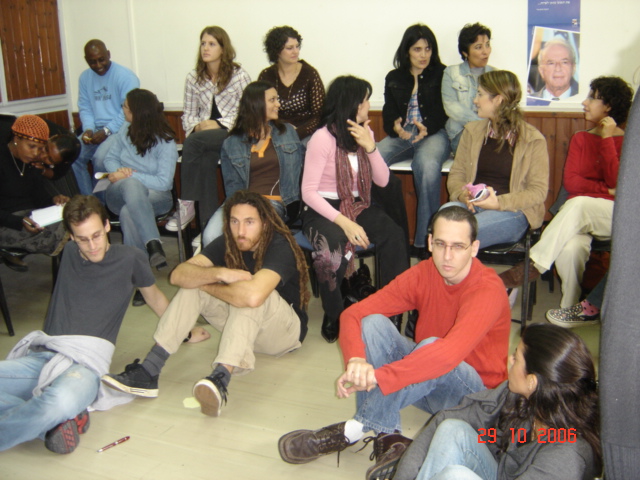The center of critical feminist pedagogy aims to motivate educators to develop social consciousness and become activists for social changein their schools and organizations. The center offers in service trainings, projects development in formal and non formal frameworks, educational staffdevelopment and publications. The Center works with marginalized populationssuch as poor neighborhood schools, Arab schools and organizations, EthiopianJews, children of migrant workers.

Goals
Preparing educators and activists for alternative political educational work.
Raising social awareness and advance applications of critical pedagogy in educational frameworks.
Teaching theory and practice of critical feminist pedagogy.
Writing and disseminating educational and academic materials.
Creating relationships with academia and organizations for social change.
Initiating new projects in a Freirian spirit of equity.
Produching practical materials for use of educators. Creating in Israel and abroad a network of educators who promote critical feminist pedagogy.
Rational
Schools have crucial obligation to society in addition to their commitment to individual students. The success of students depends not only on their own merit but on the prospects of creating a multicultural democracy that can address social and ecological problems. Our society is plagues by economic inequality, violence and social injustice. It is dominated by values of consumerism, growing alienation and self destruction. Education, therefore must have a wide vision of just society that will shape our practices and show us where we are all headed.
A true school reform should have democratic, social values and goals . Ethnic tensions, nationalist fanatics, gender and class biases, homophobic and abilist discriminations are all woven into our social fabric. Schools failure to address this issues is tied strongly with the poor performances of standardized tests, technocratic practices in education and teachers low position in society. Our classrooms need to be animated by broad vision of equity, democracy, and social justice. Unless we do so, educational achievements will not go up. Sorting and, labeling and tracking children in schools preserve pockets of privileges and keep children of known groups low in the social scales. Teachers have a measure of autonomy in their classrooms to create a space that can profoundly effect the life of children. Teachers can create classrooms of hope where students and teachers live in a kind of society that we would all want to live in, where students learn the academic and critical skills needed to make our society a reality.
There is a need to provide frameworks, identify sources that can support the efforts of a classroom transformation. We believe that a social pedagogical vision should refer to curriculum and class practices that are grounded in the lives of the children. God teaching begins with a respect for children their innate curiosity and their capacity to learn. Curriculum should be rooted in children's needs and experiences. The curriculum should equip students to talk back to the world. From an early age students must learn to pose essential critical questions about who make decisions, and who is left out? who benefits and who suffers? why is a given practice fair or unfair? what alternatives we may imagine? what is required, or what can we do to create a change?
The Center activities
This year activities include:
IIPE International Institute of Peace Education, with The Center of Peace Education, Teacher College, Columbia University, and the Jewish Arab Center of Haifa University and Seminar Hakibbutzim Teacher College. 28.7-4.8/2008.
Consultation to WiezmanElementary School in Jaffa Project: Educational bridge for Jewish and Arab empowering Education.
Courses of Critical pedagogy and English as Second language for the activist of Hanoar Hoved Youth Movement.
On line course of Critical Feminist Education:
Workshops of Critical Feminist Education: the Women Coalition for Peace, the unit of Social Involvement at the Hebrew University, The department of Youth at Risk in the Ministry of Education, Kedma School in Jerusalem, Keshet School in Jerusalem, Kiryat Yearim boarding school,
Consultation to the Children Museum on the "invitation to Silence" exhibition, Norar Haoved initiative with refugee children,
Consultation and supervison to social change organizations; mahapach, Alon, Reut-Sadaka, the ceter of migrant workers.
Participation in research group of citizenship education
.